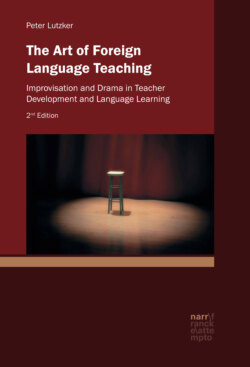Читать книгу The Art of Foreign Language Teaching - Peter Lutzker - Страница 35
На сайте Литреса книга снята с продажи.
2.3 Goals of Language Teacher Development
ОглавлениеSince the clowning courses clearly fall into the realm of teacher development as opposed to teacher training, it will be instructive to consider how this concept is presently understood in the context of language teaching. In surveying the literature it becomes apparent that most educators see the primary dimension of language teacher development in the acquisition of skills and knowledge and the establishing of connections between theory and practice.
Jack C. Richards sees strong connections between the role of professional development in responding to teachers’ wishes to expand their knowledge and clarify their principles and a subsequent improvement in their classroom practices. He identifies six key areas of professional development which such in-service teacher development courses can address: subject-matter knowledge, pedagogical expertise, self-awareness, understanding of learners, understanding of curriculum and materials and career advancement. Common to all of these areas is that they are primarily based on acquiring more knowledge and/or skills: even the category of self-awareness is defined as knowing oneself better as a teacher, including one’s strengths and weaknesses.159
Tarone and Allbright (2005) distinguish between the needs of novice and experienced teachers. They argue that those experienced teachers who seek out in-service programs are most likely to be looking for in-depth understanding of educational theory in order to support and improve their classroom practice. They view this as a kind of fine-tuning of teaching skills. In contrast, they maintain that novice teachers need to learn general teaching skills and, at the same time, expand their base of knowledge about language teaching and learning in order to establish a framework within which they can make more informed decisions.160 In both cases, there are clear parallels to Richards’ largely knowledge and skill-based understanding of the role of in-service training.
Although this cognitively based approach can be viewed as reflecting a widely held view of professional development, fundamentally different perspectives have also been introduced. Edelhoff’s understanding of the professional development of language teachers focuses on the teacher’s personality. In drawing distinctions between training and development, he sees the function of in-service development as offering the possibilities of a holistic and transformative change:
More crucial than all the professional qualities required of teachers, are those fundamental personal characteristics and qualities which can hardly be planned in the curriculum but which, nevertheless, have to be considered in the description of what is necessary to attain the goal of a ‘good school’. According to Hartmut von Hentig, the most important curriculum is the teacher’s personality. I would include the following qualities:
Enthusiasm, curiosity and ability to learn Ability to be moved and to be engaged Intercultural and social skills
Strength of character, civil courage and the strength to stand up to one’s principles
Love of children and humanity in general, empathy and compassion The ability to open oneself to others
The ability to engage in dialogue161
While admitting the difficulties of invoking such far-ranging changes, he considers their decisive importance in determining the quality of teaching as justifying the search for in-service training which could help to make such developments possible:
Even though it is difficult to teach these qualities, one can nevertheless discover and initiate possibilities and methods in adult education in which these abilities can be acquired and developed – for this is where the primary task of self-sought and institutional development lies; namely in the field of human relationships and in the interchange between school and society.162
Drawing on the insights of humanistic psychology Legutke has also emphasized the holistic elements of professional development for language teachers which offer possibilities of substantial change and growth. In this respect he stresses that change on the level which he is referring to necessarily implies a willingness to take risks and go beyond familiar ways of behaving and thinking.
Change is always connected to the willingness to take risks in going beyond what is known and familiar. Teacher development can only lead to this willingness to take risks if it fosters the steadfastness of the teacher, supports self-confidence and provides the appropriate help in these areas. (…) Only if in-service courses are perceived as being personally relevant, as fostering self-perception and the understanding of others, as helping teachers to be able to discover possibilities of self-development – only then will these courses serve to promote professional growth.163
In this context it becomes clear that beyond the specific demands of language teaching, fundamental issues of personal development and change are also being touched upon. The issue of teacher change has consistently emerged as a particularly complex and difficult issue in the field of teacher education, not only in regard to changing entrenched attitudes and methods of experienced teachers, but also at a pre-service level in which the deeply formative effects of teachers’ own experiences as pupils have consistently been found to profoundly influence their entire thinking and behaviour.164
